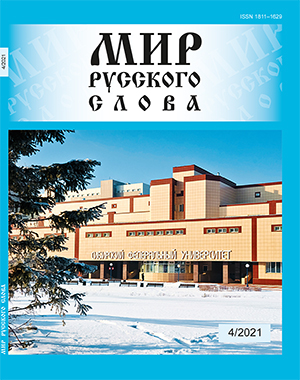Tropological Substitutions of a Personal Name in Russian Poetry of the 18th Century:Grigory Potemkin’s and Emelyan Pugachev’s Appellations in Panegyric and Invective
DOI:
https://doi.org/10.24412/1811-1629-2021-4-38-46Abstract
The article is devoted to the principles of tropological substitutions of a proper name in Russian poetry of the 18th century. As examples, the authors take various forms of the naming of two historical characters, Grigory Potemkin (1739–1791) and Emelyan Pugachev (1742–1775), and analyze three types of tropological substitutions: antonomasia, impersonation, and paraphrase. Potemkin’s naming methods are diverse. The most common is calling the hero by his last name, sometimes with the addition of a title or military rank. The appearance of tropological substitutions — first of all, of the most diverse paraphrases — is associated with the glorification of him as a commander, statesman and patron of the arts. Sometimes the very name “Potemkin” becomes antonomasia, meaning ‘formidable military leader’. The surname “Pugachev”, as well as the hypocoristic name “Emelka”, are often used in an extended metonymic sense: ‘Pugachev and his army’. The historical character himself is often referred to through periphrases and antonomasias, and only occasionally by his last name. In Sumarokov’s and Derzhavin’s works, Pugachev is compared with the famous impostors of the past – Razin, Otrepiev, Smerdis. Several appellatives used in poetic texts are also recorded in official documents of the 1770s, including Pugachev’s verdict. The presented material demonstrates that semantic rethinking of a personal name is associated with the assimilation of one character to another. The idea is realized in personifications, periphrases, and antonomasias. Tropological substitutions of personal names in Russian poetry of the 18th century allow the panegyric poetry to form an image of an ideal reality, and the invective poetry to realize the function of denunciation.
Keywords:
18th century, Russian poetry, Grigory Potemkin, Emelyan Pugachev, panegyric, invective, tropological substitutions, personal names
Downloads
References
Литература
Dictionaries
References
Downloads
Published
How to Cite
Issue
Section
License
Articles of "The World of Russian Word" are open access distributed under the terms of the License Agreement with Saint Petersburg State University, which permits to the authors unrestricted distribution and self-archiving free of charge.




